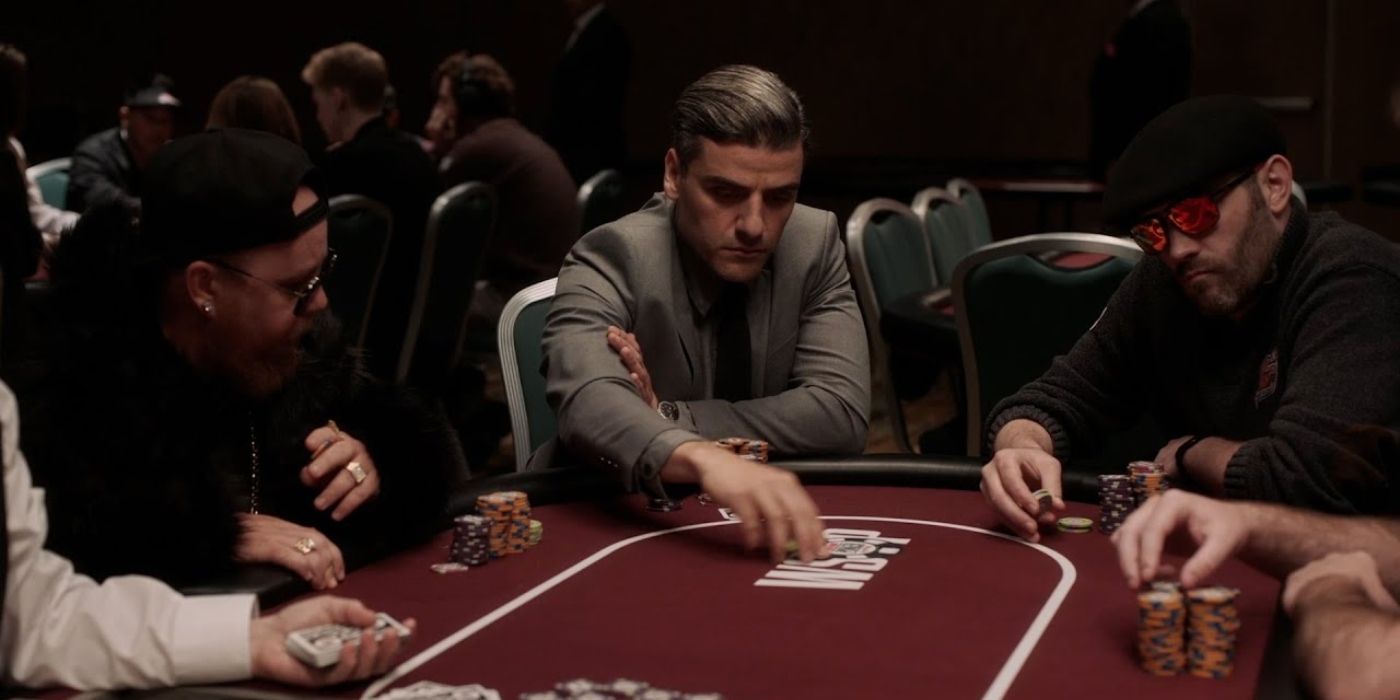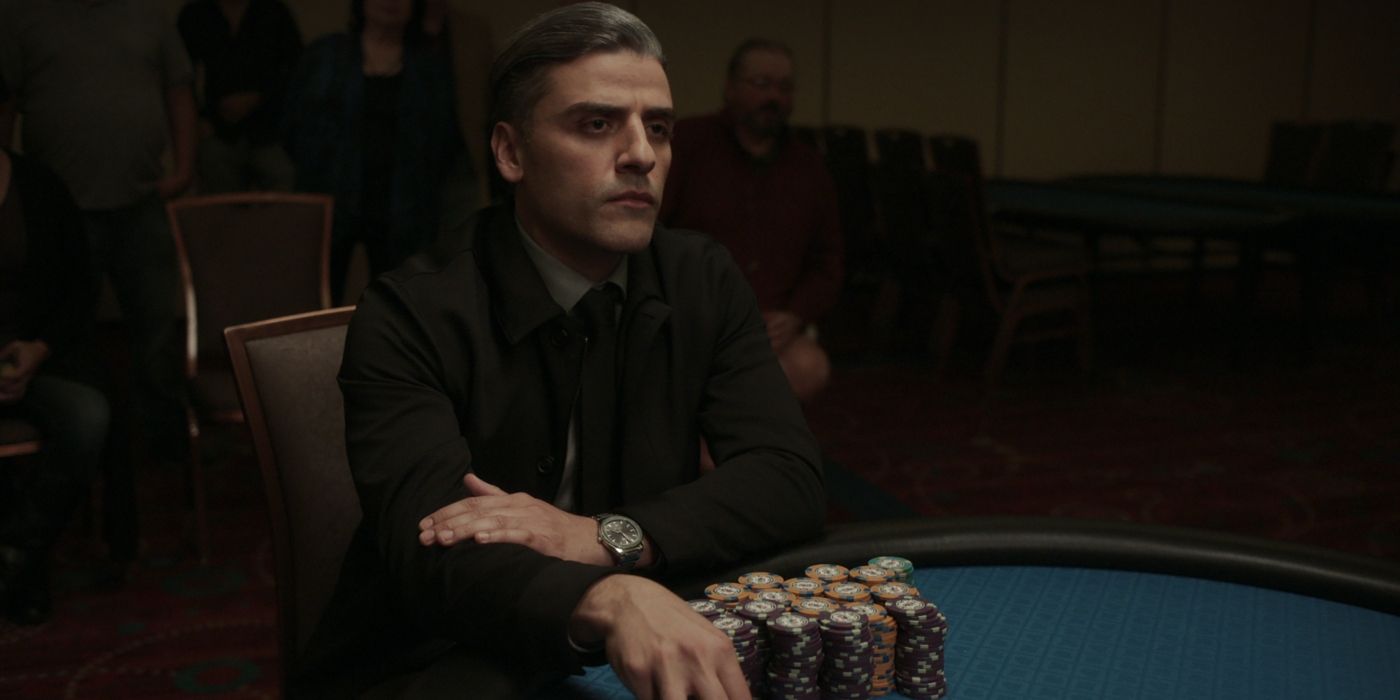The Card Counter is a meditative film that delves into plenty of heavy topics through the film's lead character, William Tell (Oscar Isaac). While many of the film's quieter and striking moments are punctuated by Tell's view of the world, the plot is pushed along by his poker skills. As he grows closer to a troubled young man named Kirk (Tye Sheridan) and a seasoned veteran of the professional poker world, La Linda (Tiffany Haddish), William finds himself playing higher scale tables. And, of course, far more is on the line than he realizes.
One element of The Card Counter that stands out is how the film portrays poker. The card game is a more realistic, but no less tense, variation instead of the showy version that typically appears in film and television. During an exclusive interview for The Card Counter, gambling consultant and poker commentator Joe Stapleton discussed what kind of poker portrayals in film annoy him and shared how writer/director Paul Schrader subverted them.
CBR: Pop culture had this really big, "Oh my God, poker's so cool" phase a couple of years ago. But now, other stories like The Card Counter look at the art of the game, how it really works instead of the surface-level attempts at glamor. What's it like seeing poker recreated in cinematic form like that, especially as someone who's been so involved in this kind of side of the world?
Joe Stapleton: As someone who's kind of in a niche world -- that as you stated, really had a boom in 2003, until about 2010, maybe until 2013 or so -- you get really excited when you see this little club that you're a part of represented in mainstream media. But oftentimes, that representation can be almost insulting. You're like, "Oh, this isn't really for or about us at all. This is someone's idea of what poker is and how it should be represented on screen."
What's really cool about The Card Counter is that they really wanted to make it as authentic as possible and wanted to make sure that poker players didn't walk out saying, "Well, that would never happen." Or, "That's crazy." Luckily, because they cared so much about that, I got to take on a little bit of a moonlighting job that's different from what I usually do.
What was it like getting to be so involved in the film?
It was so cool.
I'm the kind of person who is kind of neurotic. I never enjoy anything while it's happening. I only focus on the stress of it. Just the tremendous pressure of now... I made such a big deal about my involvement in this movie and took a gamble of my own. I talked about it on my podcast, [Poker in the Ears], talked about it on all the broadcasts I do for over a year now, so I really took a chance that things were going to come out with, not just me possibly embarrassing myself, but also rolling the dice on this movie, which by the way, turns out it's pretty good.
It's not this seedy side of poker that doesn't portray the game in a positive light, but it's not the glamorous side either. It's just the regular people who are playing poker in Mississippi, Louisiana, Pennsylvania, just the stuff you don't see on TV but is out there. It's probably what the majority of [poker players] are doing.
The character of William is such an interesting character. He's so calm and collected. It's clear that he's really analyzing this situation and has a very clear professional view of himself, juxtaposed against the "USA!" guy who spends the film with his friends loudly cheering. As somebody who's seen so much of what the world of professional poker really is, do you think someone like Mr. USA is really reflective of the mindsets of players?
I would say no. I think this is one of the more absurd parts of the movie, but it works for me. William Tell is playing the individual poker player, right? He is himself and Mr. USA is an amalgamation of all of the other characters you might see at the poker table. It's quite exaggerated in a somewhat unbelievable way. Obviously, with the undertones of the film about telling the past, this part of it kind of hits you on the nose a little bit, but I liked it. It wasn't completely unrealistic. We've seen those moments of people on TV with their friends on the rail and them behaving like complete idiots when they win a hand. I just thought that this particular character was probably as one-dimensional as we'd get in this movie.
It manages to sort of be the focal point of so many of the themes of this movie: the loudmouth, the American, the overconfident, the lucky, just all of those sort of players rolled into one character. I get it. Obviously, it's supposed to stand out and it does. Some people, that's all they have to resort to, right? It's like being a really dirty basketball player. If I can't make three-pointers then I'm just going to shove my elbow into your guts when we're down in the paint. That's kind of what those loudmouths are doing at the table. If they can get a perceived edge off of you by upsetting you, they're going to do that.
Is there any particular element of the way that William plays or the way that the film conveys playing poker that really stood out as something that is reflective of playing poker in real life?
When Focus Features asked me to do their EPK, they asked me to write up five poker tips. I wrote up not just five poker tips -- because that's been done a million times before -- but five poker tips I thought would help people to understand the character of William Tell a little bit more.
There is an elephant in the room here: the film is called The Card Counter. Card counting is not something that poker players do. Technically, they know there are four Queens in the deck, so if they have one, there's three left, but that's not really counting cards. That's a blackjack thing.
What poker players do is actually more impressive than counting cards because counting cards is math. It's just a system. The big trope of cinema and TV, is Tells. That's not really a thing. I've interviewed, I don't know, probably a hundred poker tournament champions? None of them have ever mentioned spotting a tell. What they do is actually more impressive than that. They are using every tiny little bit of information they get off of you, which sometimes includes some of your body language, but it mostly includes how much did you bet before the flop? How much did you bet on the flop? Why did you check the turn? Why did you raise the river? What sorts of hands would you do this with? What's your position? What's my position?
These are all things that poker players are factoring into their decision-making. The magic of reading someone's face is really something that sort of pales in comparison to just analyzing all of this information, your past behavior included. That's sort of what I really like about this film, is that William Tell is not flashy. Tell is not trying to talk to someone to get a read on them. He's just accurately assessing the situation based on the information he's got and dealing with it in a cool and calm manner. As we know, that's what he does off the table also.
The Card Counter, written and directed by Paul Schrader, is now playing in theaters.



